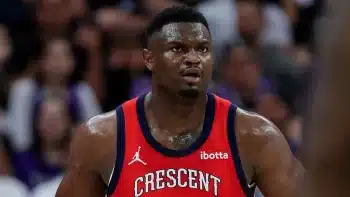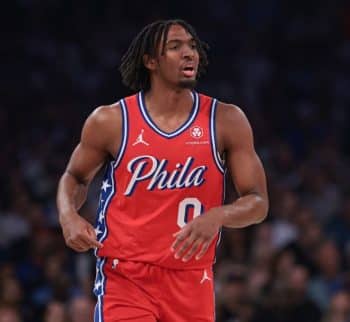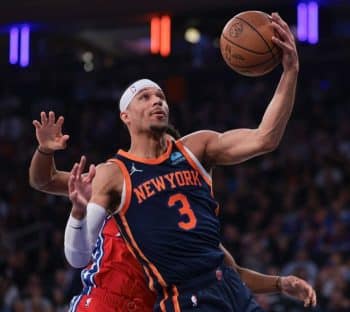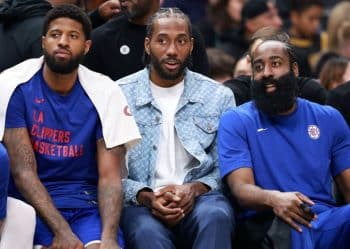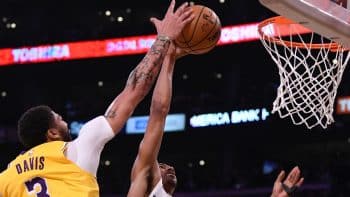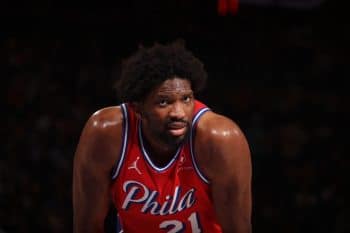NBA
NBA Daily: The Case for Blake Griffin

Blake Griffin has had quite the journey over the past year. He started off the 2017-18 season by signing a five-year, $173 million contract with the Los Angeles Clippers. He missed roughly 30 percent of their games before being traded to the Detroit Pistons a few weeks before the all-star break in blockbuster fashion. The biggest question behind the trade wasn’t whether he could help the Pistons, but whether or not he was worth his contract and what they gave up to acquire him.
Sure, he’s a five-time all-star, nearly boasts a career double-double average and is one of the most exciting players in today’s NBA. But he’s had an injury-riddled career (five years since Griffin played at least 80 games in a season), he’s never made it to the Western Conference Finals on a more-than-capable roster and his inefficiency from three could definitely be considered a negative in the modern era. The case for Griffin is definitely a compelling one, so let’s look into it even further to see what we find.
The latter half of the season, where Griffin began to settle in with the Pistons, wasn’t exactly ideal. He led the team in points per game, assists per game, and ranked second in rebounds per game – but they missed out on the playoffs. They ended the season as the ninth-place team in the Eastern Conference and were a whole four games out of the eighth seed. And considering the competition, that’s not really a positive.
He ended the season with the second lowest points per game average of his career, his worst rebounding season, and his first time missing the playoffs since his rookie year. On top of it all, former Los Angeles Clippers pre-season teammate and current Utah Jazz swingman Joe Ingles roasted him on Twitter.
Always knew u wanted my jersey… my clippers one is probably hanging right next to yours in staples somewhere
— Joe Ingles (@Joeingles7) September 19, 2018
However, all hope is not lost. Griffin, despite his injuries, has been a staple in this league for many years. This isn’t by accident. He is one of the more athletic players the NBA has ever seen, he’s improved his outside shooting enough to be a consistent 34 percent and his status as a veteran give him both credibility and experience to lead this Pistons squad back to the playoffs. His performance with the Pistons last season was by no means a sign he is slowing down, but more so assimilating a new role in a new city and with a new team running a different system than what he grew accustomed to in Los Angeles.
The first bit of evidence pointing to the claim that Griffin has not yet fallen off is his per 36-minute splits during his 25 games with the Pistons. Like I previously mentioned, his 19.8 points per game was almost a career-low, but on a per 36-minute basis it jumps up to 21.5-point average, which is more in line with his career scoring numbers. His diminished rebounding role can easily be chalked up to playing alongside Andre Drummond, who has led the NBA in rebounding over the last five seasons.
Griffin’s ability as a playmaker was the biggest plus we saw towards the end of the season. He averaged 6.2 assists per game as a Piston. This was not only the highest on the team during his tenure there, but also a greater average than any other player on the roster for the duration of the season. Considering the fact that he was surrounded by new players feeding him the ball, he still had a fairly efficient shooting clip at 34.8 percent from three and 78.4 percent from the charity stripe.
Now, on to his contract. It would be hard for anyone to argue that he wasn’t deserving of a maximum contract. When healthy, he’s a top 20 player in the league and arguably top 10 at times. The issue that comes up is his health.
Despite only missing one entire season (the year he was drafted), Griffin hasn’t played in more than 67 games in five seasons. He also missed a handful of games in both the 2016 and 2017 playoffs. His injuries haven’t necessarily been severe, but the inconsistency at which they come up really hinders his progress and the success of his teams.
Set to make nearly $39 million at 33 years old, it’s really hard to have faith in his future well-being. Another player comes to mind, in fact. Former Lob City running mate Chris Paul, for example, has been offered a similar contract at a high age with an extensive injury history. At the end of the day, these deals may be risky, but are well worth the price if the player stays healthy and produces the way you’d expect them to.
One thing that can’t be argued? Blake Griffin can help fill out arenas. The Pistons trading away a first-round draft pick, Tobias Harris and Boban Marjanovic for Griffin could be viewed in many different lights. We all know how coveted first-round picks are in this league, and Harris is a very nice piece who is younger and historically more healthy than Griffin. But at no point in his career has Harris been better than Griffin. They’ve both been in the league long enough to get an idea of what each of their ceilings looks like. Essentially, it’s difficult to see who got the better end of the trade without looking a few years down the road.
But one thing is certain. On strictly a business-level, Griffin and his star-like qualities will help the arena fill out and get fans more excited about the upcoming season. Few players can attack the rim with such tenacity as him and even fewer players can keep that same energy throughout an entire game.
Much has been discussed about Griffin, both positive and negative, but there is definitely a reason for optimism entering the season. On media day, Griffin had this to say: “Having a full summer being healthy, being in the weight room, being in the gym, since the end of May [was] a first for me.”
He alluded to the fact that having almost five full months to actually work on things he felt he needed to would have a huge impact on his game this upcoming season. “I feel great, I feel as strong and as explosive as I have in the past two, three years,” said Griffin, “so that will continue to get better as I continue to work.”
A media member asked Griffin the value of getting to know his teammates better and he responded saying, “Basketball and chemistry…it’s forever growing and forever becoming a stronger bond.”
He mentioned how going through all the little things like summer workouts, beginning of camp, preseason, etc., can really improve team continuity, as well.
In making a case for Griffin, there are plenty of points that can be brought up. Will his on-court production equal the value of his contract, especially in the later years? Will he stay healthy enough to lead the offensive unit? Will he continue to work on his game and bring this team to the playoffs?
Griffin stated that the team’s confidence should be high: “In the East, with our roster, I don’t see why getting home court in the playoffs is not a reasonable expectation,” he said.
For a player entering his prime years, with career average splits of 21.5 points, 9.2 rebounds, and 4.3 assists per game (on 50.8 percent shooting from the field), we really shouldn’t be doubting the former five-time All-Star. He’s a capable athlete who has proven time and time again that he has what it takes to compete and more so what it takes to win. It ultimately comes down to his health.
A healthy Griffin not only helps Detroit make the playoffs, but potentially a conference finals down the road.
